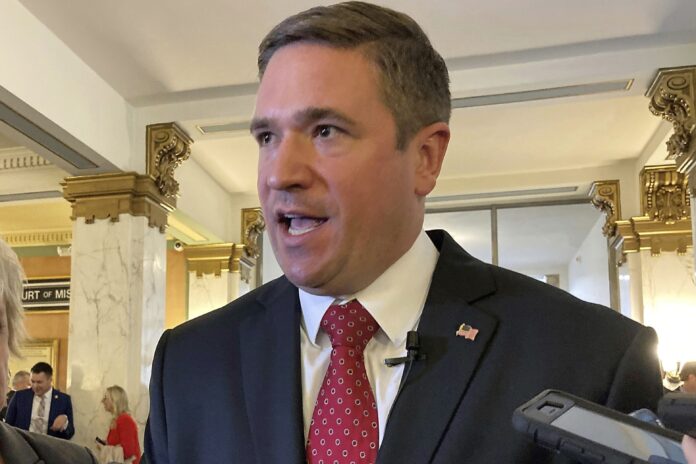Adam Peters, a fervent Republican and chairman of Ellis County, stood in front of a crowd of fellow Republicans in the Riverside Baptist Church in Hutchinson, weaving a narrative filled with conspiracy theories and extremist ideas. From imagined plots of liberals brainwashing children to demonizing LGBTQ-friendly church pastors and painting critical race theory as the villain, Peters presented a disturbing vision for the state.
At this meeting, Peters outlined an ambitious yet ominous plan – to turn Kansas into a sanctuary for extreme conservatism. Supported by two state legislators and local GOP officials, he framed this transformation as an inevitability and reassured his audience that they were fighting on the right side, God’s side.
In his address, he made it clear that the Republican mission must focus on purging the state of anyone disagreeing with their hardline stance on the LGBTQ community, reproductive health care, education, and race. The recording of this conversation revealed a shocking plan to cultivate a hostile environment for groups they deemed “bad people,” pressuring them to move elsewhere and attract those aligned with their extreme beliefs.
With overwhelming control in both the Senate and House, Republicans seem to have a free hand to infuse policy discussions with fringe religious views. Anti-transgender restrictions, anti-abortion propaganda, public funding for private schools, and a refusal to acknowledge systemic racism have become part of the regular legislative agenda.
Democratic Rep. Tobias Schlingensiepen, a senior minister at the First Congregational Church in Topeka, pushes back against such mixing of religion and politics. He suggests that a Christian politician’s duty should be to uplift the marginalized and criticize those who accumulate wealth and power at the expense of others. Reacting to Peters’ extremist rhetoric, he criticizes those who claim to be society’s moral gatekeepers, deciding who is “good with God.”
Peters’ five-point plan for his ‘conservative sanctuary’ includes worrying propositions like absolving drivers from liability if they hit rioters blocking roads, falsely citing instances from the George Floyd protests in 2020. Amber Dickinson, an associate professor of political science at Washburn University, deems these remarks as potentially dangerous hate speech.
She also notes that Peters’ views significantly diverge from mainstream Christian beliefs. Dickinson emphasizes that while belief in a higher power can be normal, mobilizing an army for vigilante justice goes against the tenets of most religious followers.
Peters’ vision for Kansas also includes plans to make it a felony for a mob to invade a business, allow the attorney general to press criminal charges when local prosecutors decline, change the method of appointing Kansas Supreme Court justices, and ban critical theory from workplace training.
Peters’ narrative paints a frightening picture of the future of Kansas. As he rallies his followers behind this disturbing vision, we must remember the power of diverse and inclusive voices. Let’s remain vigilant, vocal, and firm in our commitment to upholding the values of justice, equality, and empathy for all, rejecting the kind of divisive rhetoric that threatens to tear us apart.



